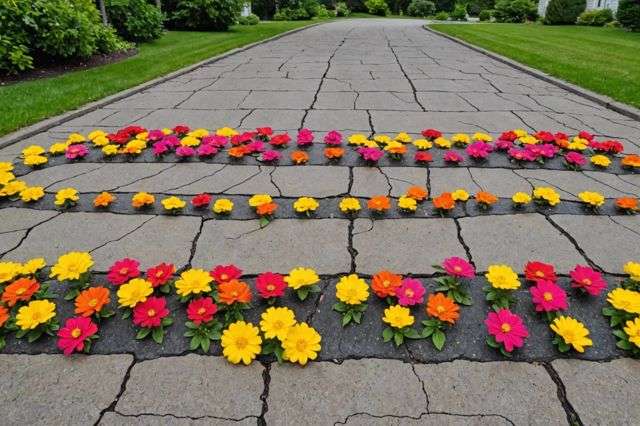
5 Signs You Should Replace Your Driveway

Replace your driveway if you notice large cracks, holes, drainage issues, frequent repairs, or significant fading. These signs indicate underlying structural problems and can lead to more severe damage if not addressed.
1. Large Cracks and Holes
When your driveway begins to display significant damage, it’s crucial to identify the problem. One of the clearest signals of a serious issue is the appearance of large cracks and holes. These aren’t minor imperfections that can be patched up or sealed easily.
Instead, extensive damage points to deeper issues with the structural integrity of the driveway. Examples would be:
– A series of large cracks. – Multiple potholes.
These problems are serious and indicate that a complete replacement might be the best solution. Rather than being a mere surface issue, such defects suggest an overall failure of the driveway’s structure. This not only diminishes the appearance of your property but could lead to worse damage over time.
A repair might seem like a quick fix, but it would only cure the symptoms, not the cause. Potholes and major cracks could be precursors to more severe problems if neglected. A full replacement ensures the long-term strength and functionality of the driveway.
Cost analysis for brick driveway paving shows that continual repairs to these larger damages might prove to be a costlier route. A new driveway eliminates the need for repeated fixes. Addressing these signs early on can help maintain your home’s curb appeal and functionality, while avoiding potential damage to your property.
Identifying the problem and deciding on a complete replacement when necessary will ensure that your driveway lasts for a long time while enhancing your home’s exterior.

2. Drainage Issues
One indicator that your driveway may require a full replacement is the presence of drainage problems. Problems with driveway drainage manifest as water buildup on the surface of the material, leading to degradation over time.
This typically occurs if driveway material is improperly laid or improperly graded. The right kind of slope can help direct water away from your property, but any lack thereof may contribute to water pooling in certain areas.
- Water pooling may seem innocuous, but it can actually cause substantial damage over a period of time. This is especially the case for certain kinds of driveway material, such as asphalt or concrete.
- Aside from the evident wear and tear, water buildup can lead to the growth of moss and algae, which pose serious safety hazards due to their slippery nature.
- Drainage problems also tend to speed up the freeze-thaw cycle, which can further degrade your driveway, especially during colder months.
If you’re constantly having to repair water damage on your driveway, it might be time to consider a full replacement. Remember, continual repairs are not only tedious, but can also be more expensive in the long run.
After the replacement, to aid water runoff, consider installing underground drainage systems or adjusting the gradient of your driveway. These measures can help prevent future water pooling and delay wear and tear, saving you both time and money in long-term maintenance.
3. Fading and Discoloration
A driveway’s color can reveal a lot about its condition. Over time, exposure to weather conditions, coupled with constant use, may cause your driveway to fade and discolor significantly.
- UV radiation, a prime factor behind fading, can cause your driveway to deteriorate. This is a sign that the driveway is losing its protective properties.
This fading is more than just an eyesore – it’s a signal of compromised material integrity. Not only can it reduce your property’s curb appeal, but it can also develop into more substantial issues over time.
- An extensively faded and discolored driveway might not have the same strength and durability as when it was new.
Replacing an old, faded driveway can offer a more durable and appealing surface that enhances the longevity and visual charm of your property. It prevents recurrent repair costs and potential property damage, making it a more practical solution in the long run.
- A new driveway means fewer repairs. Moreover, the right materials can make it last for years, reducing long term costs.
In conclusion, pay attention to your driveway. Extensive fading and discoloration are signs not to be overlooked. Understand that replacement isn’t just for aesthetics – it’s a critical step in maintaining the integrity of your driveway for years to come.

4. Frequent Repairs
Frequent repairs on your driveway can be a financial drain. It might signal that a full replacement is the better economic decision. Several relevant factors are:
- Constant patchwork costs can accumulate over time. These continual expenses might outweigh a one-time investment in a new driveway.
- Constant repairs suggest that deeper structural issues might be present. These issues can’t usually be fixed by minor patchwork. A full replacement ensures a completely new and durable surface.
- Not only can a new driveway save you on repair expenses, but it can also contribute to preserving your home’s curb appeal and functionality.
Choosing the right time for replacement can save you recurring costs and potential property damage. With a fresh, durable surface installed by professionals like us at 360 Remodeling and Building, you will no longer have to worry about frequent fixes. Your driveway will not only look good, but it will also last for years.
In some cases, prevention can be equivalent to replacement. Measures to maintain a driveway include:
- Redirecting water away to avoid water damage.
- Managing nearby vegetation to prevent root intrusions.
Best practices for installing pavers can help ensure a well-maintained driveway. But when the costs of constant fixes become burdensome, a full replacement is often the more financially sound choice.

5. Age of the Driveway
The lifespan of driveway materials is crucial when considering a replacement. For instance, asphalt driveways often last around 20 years with proper maintenance. So, if your driveway is nearing or beyond this age, continuous remedies might not be adequate. Accumulated patches and resurface attempts can no longer bear the load and installing anew becomes necessary. Precisely, driveways aged between 20-25 years often encounter a rising frequency of problems.
Ensuring the endurance of driveways is significant to maintain safety and visual appeal. Driveway replacement could eventually be more cost-effective than constant repairing. This offers a long-lasting solution rather than a momentary fix. Hence, noticing the age of the driveway is vital for better maintenance and decision-making on suitable remedies.
Before you have to deal with constant driveway issues, consider opting for a fresh install through reliable professionals. Early interventions can save you from regular repair headaches and add value to your property.
Always remember that preventative measures prove beneficial for preserving new driveways. For example, deferring water away from the driveway and managing nearby vegetation can prolong its lifespan. Get your free estimate today for a durable driveway solution from 360 Remodeling and Building.

FAQ
What are the signs that my driveway needs a complete replacement?
When your driveway shows large cracks and holes, experiences drainage issues, displays significant fading and discoloration, requires frequent repairs, or is simply old, it might be time to consider a full replacement. These indicators suggest deeper structural problems that cannot be resolved by simple repairs.
Why is it important to address large cracks and holes in my driveway?
Large cracks and holes are not just surface issues; they indicate serious underlying problems with the driveway’s structural integrity. Addressing these issues promptly by considering a full replacement can prevent more severe damage and ensure the long-term functionality and appearance of your driveway.
How do drainage issues affect my driveway’s condition?
Improper drainage can lead to water buildup on the driveway surface, which accelerates wear and tear, and can cause moss and algae growth. These issues not only damage the driveway material but also pose safety hazards. Installing proper drainage solutions during a full replacement can prevent these problems.
What does the fading and discoloration of a driveway indicate?
Fading and discoloration are signs of material deterioration due to exposure to weather conditions and UV radiation. This not only affects the driveway’s appearance but also its strength and durability. Replacing an old, faded driveway can enhance your property’s curb appeal and structural integrity.
When should I consider replacing my driveway instead of repairing it?
Consider replacing your driveway if you are dealing with frequent repairs, significant structural damage like large cracks and potholes, serious drainage issues, or extensive fading. Also, if your driveway is over 20 years old, replacement might be more cost-effective than ongoing repairs.
